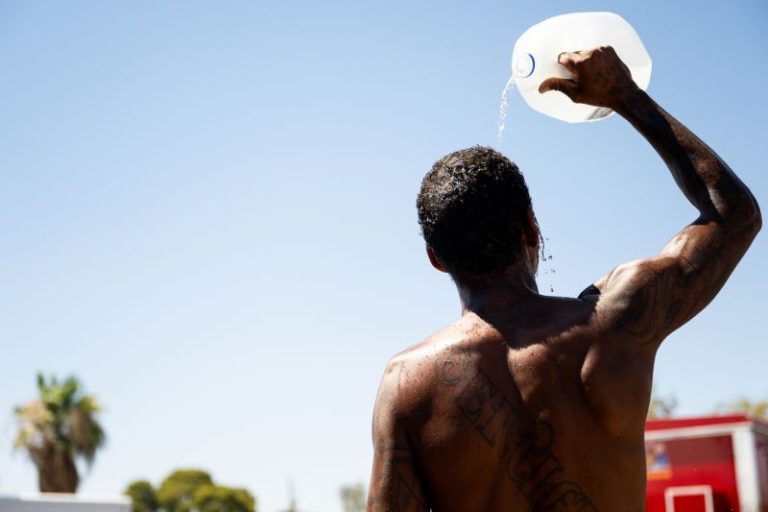Phoenix once again hit 110 degrees Monday for a record-tying 18th consecutive day at that temperature or higher as the Southwest sizzles under a deadly, unrelenting heat wave.
The record is expected to be broken Tuesday as the streak continues, with temperatures of at least 115 degrees in the forecast for Phoenix every day through next weekend.
Heat is the number one killer of all natural disasters, studies show, and as temperatures continue to rise, scientists expect it to make even more people ill.
With residents cranking up their air conditioning this heat wave, Arizona Public Service utility customers’ demand on Saturday set the record for the most electricity used at once in the utility’s history, according to a news release from the company.
It’s not just Arizona sweltering in the intense heat: Over 90 million people are under heat advisories across the United States, including at least 50 million who have been under heat alerts for the past 10 days.
There have been heat alerts for dangerously high temperatures in the Southwest – stretching from Texas to Arizona – for 38 consecutive days dating back to June 10.
And the streak shows no signs of ending any time soon. The heat is expected to continue across the region through at least July 28, and overnight temperatures will provide very little relief, the National Weather Service warned.
More than 1,500 record-high temperatures were recorded in the US so far this month, according to the National Oceanic and Atmospheric Administration.
Over 35 daily high temperature records were broken on Sunday alone, according to the weather service, with Death Valley, California, hitting a daily record-breaking 128 degrees and Las Vegas shattering its record with 116 degrees.
Phoenix and Tucson, Arizona; El Paso, Corpus Christi and Brownsville, Texas; and Tampa and Fort Myers, Florida, are all having their hottest July’s on record to date, according to NOAA climate data.
El Paso reached 100 degrees for the 32nd straight day, “with no end in sight,” the weather service tweeted. The previous record for consecutive days over 100 was 23 in 1994.
“Take the heat seriously and avoid extended time outdoors,” the weather service said. “Temperatures and heat indices will reach levels that would pose a health risk, and be potentially deadly, to anyone without effective and/or adequate hydration.”
Patients being placed in body bags with ice
“The heat is taking a major toll,” LoVecchio said. “The hospital has not been this busy with overflow since a few peaks in the Covid pandemic.”
Body temperatures of 107 or higher can result in death or permanent brain damage. LoVecchio said it could take as little as five to 10 minutes to cause brain cell death at these high temperatures.
LoVecchio said that pavement in the sun can reach up to 180 degrees. Patients may fall on the pavement due to dehydration, heat stroke or another medical condition, he said.
“It doesn’t cool down here at all and surface temps can get so ridiculously high and people can get burns in a matter of seconds,” Murphy said.
Over the past five years, Murphy said contact burns have become a “big problem.”
Everyone is susceptible to heat related injuries, including those who have lived in Arizona for their entire lives, Maricopa County Department of Public Health spokesperson Sonia Singh said.
“It doesn’t matter how long you’ve lived in the heat, how old you are or how healthy you are,” Singh said. “It impacts everyone.”

